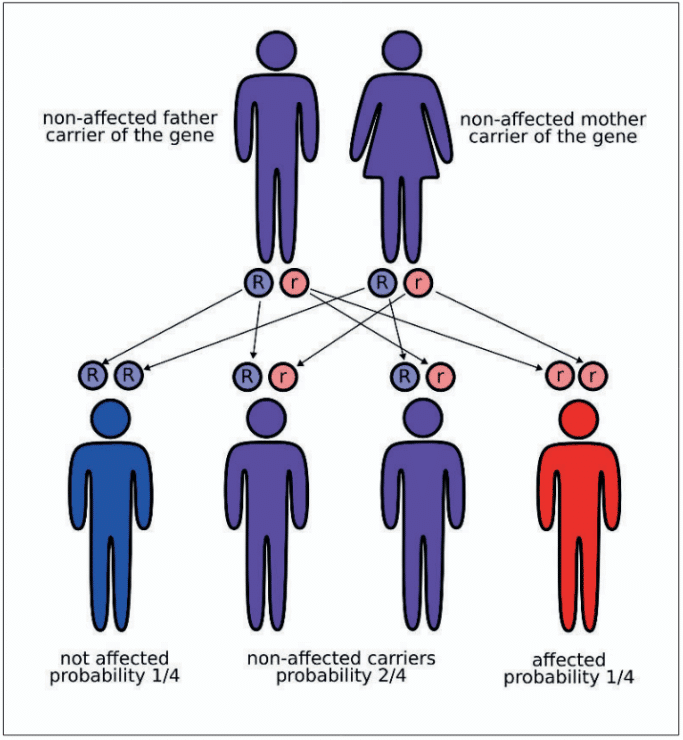PCH2A is very rare disease. In Germany, approximately one in every 100,000 births is affected.
Inheritance
Human genetic information (DNA) is found “tidied up” in so-called chromosomes within a cell. There are two copies of each chromosome in every human cell (except for the X chromosome in men). These chromosomes store our genetic material in sequences called genes. This means that each gene exists twice, once on one chromosome and once on the other. In PCH2, the parents each have a corresponding genetic change (mutation) on only one of their duplicate chromosomes. Their respective second genes remain unchanged.
Parents pass on one of their chromosomes each to their biological children. This means that every human carries one chromosome from their father and one from their mother.
PCH2 has an autosomal recessive inheritance pattern, which means that the disease only develops if the mutation is present in both chromosomes, i.e. in both copies of the affected gene. People with only one affected copy do not develop the disease, but they become carriers.
If parents who carry the mutation for PCH2 each pass on the affected chromosome to their child, the child will have two mutated genes (this is called homozygous), leading to PCH2. If only one parent passes on the altered gene to the child, but the other parent passes on a healthy gene, the child will not develop PCH2. This makes the child a carrier, however (the term for this is heterozygous), and it can pass the mutation on to its own children. If both parents pass on the healthy chromosome to their child, the child will be healthy and not a carrier.
In purely mathematical terms, parents who are both carriers of the altered gene therefore have a 25% risk of conceiving a child with PCH2. Fifty percent of their children will be heterozygous carriers without developing PCH2, and 25% of their children will not inherit the mutation at all.
The pathogenic (disease-causing) mutation for PCH2A was found in 2008. It is a mutation in the TSEN54 gene on chromosome 17q25. Most European patients have the mutation 919 G>T, p.Ala307S.
These findings have enabled prenatal molecular genetic testing in affected families to determine whether the unborn child has PCH2A or not.
- Budde BS, Namavar Y, Barth PG, Poll-The BT, Nürnberg G, Becker C et al. tRNA splicing endonuclease mutations cause pontocerebellar hypoplasia. Nat Genet 2008; 40(9):1113–8
- Namavar Y, Barth P G, Kasher P R, van Ruissen F, Brockmann K, Bernert G, Writzl K, Ventura K, Cheng E Y, Ferriero D M, Basel-Vanagaite L, Eggens V R, Krägeloh-Mann I, De Meirleir L, King M, Graham J M Jr., von Moers A, Knoers N, Sztriha L, Korinthenberg R, Dobyns W B, Baas F, Poll-The B T (2011) Clinical, neuroradiological and genetic findings in pontocerebellar hypoplasia. Brain 134(Pt 1): 143-156
